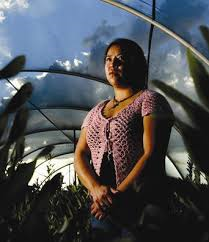The lines on the form are too short so I draw small arrows indicating that the reader should flip the paper over to read more. Most Saturday mornings that I volunteer at the Justice For Our Neighbors immigration legal clinic I could fill a notebook with the stories I hear.
I started volunteering at JFON a little over a year ago because I wanted to practice my Spanish. I usually do intake interviews which means filling out paperwork that the lawyer will review when she meets with the new client. The forms ask about income and savings and members in the household. They ask about arrests and imprisonments and jail sentences. They ask about entrances and exits from the United States. They ask if the person has ever been a victim of a crime and if they came to the United States against their will. Sometimes the questions feel intrusive. But each question could lead to an answer that provides a path that leads to a door with a lock to which the person on the other side of the desk from me in the bare church office may learn they have a key. Or not. It’s not my job to assess the case, only to hear the first telling of it.
Behind every word I write on the form is a story – a story of family left behind, of danger escaped, of hope followed, of fear of being caught. I asked Luisa, “Are you afraid for your life if you return to your country?” Her twenty minute answer of black eyes, broken teeth, a broken arm all at the hands of her common law husband, whose drinking buddy is the chief of police, whom she finally left when he threatened her with a knife didn’t fit in the lines. I asked Minerva, whose husband Rogelio had been deported, Has he been convicted of a crime? She told me about their home being broken into multiple times and Rogelio had gone after the perpetrator when they ran into each other on the street, but Rogelio’s lawyer hadn’t told them that the plea bargain would result in Rogelio’s deportation and they didn’t know that Rogelio’s deportation may have been stopped because he had helped the police investigate their home invasion. I asked Mario, “Were you brought to this country against your will?” he laughed out loud. His answer, a commentary on the devastating effects of NAFTA on the Mexican farmer, was that he hadn’t wanted to leave his town, his wife, his children, but in 1996 it was no longer possible to survive on the income from his small family farm. I wrote, “No,” on form.
Behind every statistic is a story. Behind every applause line in a political speech are actual people in actual circumstances. To learn more about the complexities of immigration check out these websites:

Recent Discussions